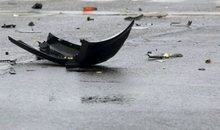
 Flash News
Flash News
Ceno Klosi with over 800 stolen votes, Balluku finds the reason is the tiredness of the counters
"Fast & Furious" in the former Block, police chase an Audi Q8, 4 cars collide
Car hits two tourists on a motorcycle in Fushe Arrëz, one of them dies
Serious accident in Thumanë, one dead, 3 injured
Durrës Court suspends the director of Pre-University Education from duty

Alfred Lela
Arben Ahmetaj, one of the participants in constructing the edifice of the Renaissance and its government, ironically became one of those who removed the cornerstone of this building. His escape left behind not only cottages with bedrooms, in which there were drawers and vibrators, but especially a great tremor in the palace of power, which is not at all what comes from pleasure.
By taking to Switzerland the head Rama and the government had designed as non grata, ss the next to fall in the staged guillotine of SPAK, Ahmetaj neutralized the power's justifications and sentenced other heads to fall. Rama's former deputy would fall under the heavy burden of guilt and negative image produced by the scandalous incinerator affair and free the government and Rama. The Prime Minister would re-legitimize himself and the power, saying that he does not dig justice, even when it takes the number 2 and one of the long-time collaborators.
As the custom of sacrifices, which are accomplished through blood and the morbid pleasure that awakens the human soul, Rama and his ascension would be purified. The scandal of the directors of Veliaj would be another theft, not an affair that endangers the government or the largest municipality in the country.
What makes this theater, both tragic and comic, is how disposable the heads around Rama are. How they only count as a power goal. Those who until yesterday Edi Rama made them look like fellow fighters of a common cause, today are masquerades who go outside the party line, eat fruits of sin behind their backs, and endanger him and the 'collective'. This is the great paradox of Rama and his government. He came to power on the shoulders of a group of collaborators and has already turned into a back. After which those accomplices do the worst. What Rama does not dare to do, as an ethical or philosophical exercise, is that governments, both when they are causes and when they are conspiracies, are such only through the unity of a particular group, in this case, the Renaissance.
The "alliance of stinkers" thus turned out to be a sinister and failed project. The solution is not killing each stinker but cutting off the head of the problem, which is the very idea of building an alliance that gathers the worst as an anti-power goal, which later becomes power itself.
If we take a biblical motif, since both Rama and Velia act as priests of an order that has not yet arrived but that comes only through them, in the garden of Eden, the solution does not come by tying up the snake, nor by cutting the apple, but by taking it out of the garden Eve and Adam. In this case, Rama and Veliaj are examples of a system that came in 2013 precisely with the promise of heaven, year zero, protection, the end of evil, the undoing of Saliu, and so on.
Now we are at the point when Eve and Adam, Rama, and Veliaj are very close to denying and blaming each other (they are no longer left of those who eat apples without their backs, so when only those two remain, it will be understood that they are precisely those apple-eaters themselves).
In this sense, Arben Ahmetaj, fleeing, took his sins with him but also served as the opening of a scene in which the snake, the apple, and Rama with Veliaj remained. The Bible has it that the punishment of one is also the downfall of the other.
And this is the fear that creeps up more than all suspicions. Each's fall is also the other's, and with them, the paradise of the Renaissance is undone.
Latest news





Lufta në Gaza/ Pse Netanyahu do vetëm një armëpushim 60-ditor, jo të përhershëm?
2025-07-02 21:56:08
US suspends some military aid to Ukraine
2025-07-02 21:40:55



Methadone shortage, users return to heroin: We steal to buy it
2025-07-02 20:57:35
Government enters oil market, Rama: New price for consumers
2025-07-02 20:43:30
WHO calls for 50% price hike for tobacco, alcohol and sugary drinks
2025-07-02 20:41:53







Israel agrees to 60-day ceasefire in Gaza, but many unanswered questions remain
2025-07-02 18:35:27
The weather in Germany is going "crazy", temperatures reach 40°C
2025-07-02 18:22:21

"Fast & Furious" in the former Block, police chase an Audi Q8, 4 cars collide
2025-07-02 17:59:25
"Birth on a tourist visa? US Embassy warns Albanians: This is prohibited!"
2025-07-02 17:48:16


BIRN: Fier recount reveals vote trafficking within open political party lists
2025-07-02 16:57:19

CEO and former director of 'Bankers Petroleum' arrested in Fier
2025-07-02 16:40:42
Car hits two tourists on a motorcycle in Fushe Arrëz, one of them dies
2025-07-02 16:33:23



Fire at the Elbasan Incinerator Landfill, Prosecution Launches Investigations
2025-07-02 15:34:54
What you need to know if you travel to a country with active volcanoes
2025-07-02 15:33:03



EU proposes 90% reduction in greenhouse gases by 2040
2025-07-02 14:50:23
Europe is burning from the heat / Italy and France are on maximum alert
2025-07-02 14:36:52

Moscow's contradictory statements: Is the friendship with Vučić breaking down?
2025-07-02 14:21:05
'I lost my battle': Sea warming is killing fishing in Albania
2025-07-02 14:08:35
Sekretet kimike që ndihmojnë në mbajtjen e mjaltit të freskët për kaq gjatë
2025-07-02 14:01:26

Denmark makes historic decision to make military service mandatory for women
2025-07-02 13:44:33
The appeal of the GJKKO leaves former judge Pajtime Fetahu in prison
2025-07-02 13:30:20
Productivity losses could reduce GDP by 1.3% as a result of extreme heat
2025-07-02 13:21:04
He abused his minor daughter, Zamir Meta is left in prison
2025-07-02 13:04:04

Waste burning in Elbasan, Alizoti: They are poisoning people and stealing money
2025-07-02 12:48:39
Civil disobedience continues in Serbia, dozens of people detained
2025-07-02 12:40:32
Rama's government was born under the sign of garbage and will end like this
2025-07-02 12:28:09
Water prices increase in the municipalities of the Elbasan region
2025-07-02 12:13:38
Civil disobedience continues in Serbia, what is happening in Belgrade?
2025-07-02 12:07:44
Serious accident in Thumanë, one dead, 3 injured
2025-07-02 11:54:42
Durrës Court suspends the director of Pre-University Education from duty
2025-07-02 11:49:27
Plenary session on Thursday, what is expected to be discussed
2025-07-02 11:36:43
Europe is burning from heat waves/ What is the 'thermal dome' phenomenon?
2025-07-02 11:26:25
Wanted by Italy for murder, 45-year-old arrested in Vlora
2025-07-02 11:19:31
Fire situation, 28 fires reported in 24 hours, 2 still active
2025-07-02 11:13:20
"Buka" file, preliminary hearing for Ahmetaj postponed to July 17
2025-07-02 11:03:30


Baçi: Belinda Balluku and Ceno Klosi, the most dangerous "gangs" in Fier
2025-07-02 10:32:09
Zamir Meta, suspected of sexually abusing his daughter, arrives in court
2025-07-02 10:21:33

Trump: Israel has agreed to a 60-day ceasefire in Gaza
2025-07-02 10:01:55
Fire continues at Elbasan landfill
2025-07-02 09:51:13

Dates to note during July, important events will occur
2025-07-02 09:31:45
The hearing for Jorgo Goro's claim is postponed
2025-07-02 09:24:19



Foreign exchange, the rate at which foreign currencies are sold and bought
2025-07-02 08:42:31

52% of pensioners did not receive full pension in 2024
2025-07-02 08:27:18
Horoscope, what do the stars have in store for you today?
2025-07-02 08:13:36
Hot weather, Wednesday brings high temperatures
2025-07-02 07:59:16
Morning Post/ In 2 lines: What mattered yesterday in Albania
2025-07-02 07:46:15
Heatwave sweeps across Europe, Spain and England record hottest June ever
2025-07-01 22:57:41






Golem and Qerret without water at the peak of the tourist season
2025-07-01 21:09:32

Euractiv: Italy-Albania migrant deal faces biggest legal challenge yet
2025-07-01 20:53:38
BIRN: Brataj and Fevziu victims of a 'deepfake' on Facebook
2025-07-01 20:44:00

Vlora by-pass, work delays and cost increases
2025-07-01 20:24:29



Milan are expected to give up on the transfer of Granit Xhaka
2025-07-01 19:41:25

